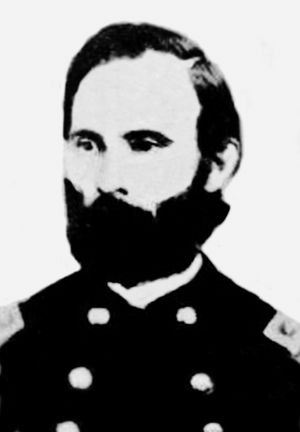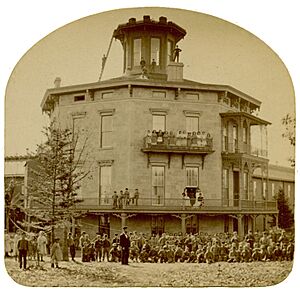James Bintliff facts for kids
Quick facts for kids
James Bintliff
|
|
|---|---|

General James Bintliff
|
|
| Born | November 1, 1824 Salterhebble, West Yorkshire, England |
| Died | March 16, 1901 (aged 76) South Chicago, Cook County, Illinois |
| Buried | |
| Allegiance | United States of America |
| Service/ |
United States Army Union Army |
| Years of service | 1862–1865 |
| Rank | |
| Commands held | 38th Wisconsin Volunteer Infantry Regiment |
| Battles/wars | American Civil War |
| Other work | Newspaper owner, editor, publisher Wisconsin government official |
James Bintliff (born November 1, 1824 – died March 16, 1901) was an important leader in the Union Army during the American Civil War. He started as a colonel and later became a brevet brigadier general. A "brevet" rank is an honorary promotion given for bravery, but it doesn't always come with higher pay or command.
General Bintliff was recognized for his amazing courage during the Third Battle of Petersburg on April 2, 1865. This battle was a big part of ending the war. After the war, he had a busy life. He helped start a big insurance company and owned and edited several newspapers. He also worked for the government in Wisconsin for many years.
Contents
Early Life and Moving to America
James Bintliff was born in Salterhebble, West Yorkshire, England, on November 1, 1824. He was the third of nine children. When he was 15, he worked as a lawyer's assistant. Later, he was a bookkeeper for a canal company.
In 1842, when James was 18, he moved to New York City with his younger brother and sister. Their parents had moved there a year before. In New York, he worked in a wool factory.
Starting a Family and New Ventures
In 1847, James Bintliff married Harriet Snook in Skaneateles, New York. They had four children: Edward, Ida, James, and Helen.
In 1851, James moved his family to Green County, Wisconsin. He started farming there. James was an abolitionist, meaning he was strongly against slavery. He even helped create the Republican Party, which was formed to oppose slavery.
After two years, he moved to Monroe, Wisconsin. There, he worked as a bookkeeper and cashier at a bank. In 1856, he was elected as the Register of Deeds for Green County. This job involved keeping official records.
By 1857, James was a newspaper editor. He also helped start The Northwestern Mutual Life Insurance Company. In 1859, he became a lawyer. In 1860, he bought half of a newspaper called the Monroe Sentinel. He bought the other half in 1861. When he left for the Civil War, he sold half of the paper to someone else to run it.
Serving in the Civil War
On September 1, 1862, James Bintliff joined the Union Army as a captain. He was part of the 22nd Wisconsin Volunteer Infantry Regiment. This unit served in Kentucky and Tennessee.
Captured and Rejoining the Fight
In May 1863, Captain Bintliff was captured by Confederate forces during the Battle of Brentwood in Tennessee. He was taken to Libby Prison in Richmond, Virginia. This prison was known for its harsh conditions.
Luckily, he was released and exchanged for a Confederate prisoner in May. He then rejoined his regiment. In December 1863, he left his army commission. President Abraham Lincoln then appointed him to a special board in Wisconsin. This board helped with army enlistments.
Leading Troops to Victory
In April 1864, James Bintliff was appointed as a colonel. He took command of the 38th Wisconsin Volunteer Infantry Regiment. He led different groups of soldiers, called brigades, at various times.
His most important command was during the final weeks of the war. He led a brigade during the Siege of Petersburg. This siege was a long battle near Richmond, Virginia, the capital of the Confederacy.
On April 2, 1865, during the Third Battle of Petersburg, Colonel Bintliff showed great bravery. He was ordered to capture a strong fort with five cannons called "Reeves' Salient." He and his soldiers successfully took the fort. This victory helped the Union Army capture Petersburg. This led to the fall of Richmond and the end of the war.
Colonel Bintliff left the army in June 1865. Because of his courage at Petersburg, President Andrew Johnson nominated him for the honorary rank of brevet brigadier general. The U.S. Senate approved this in March 1866.
James Bintliff wasn't the only one in his family to serve. His brother Gersham was a private in his regiment. His brother Thomas was a lieutenant, and his youngest brother, Alfred, was a musician in the army.
Life After the War
After the war, James Bintliff sold his share of the Monroe Sentinel newspaper. He thought about moving to Missouri, but decided against it because the area was still unsettled.
He then bought a business that sold books, stationery, and wallpaper. He ran this business until 1870. James was also active in politics. He was a delegate to the Republican National Conventions in 1868, 1872, and 1876.
In 1870, he bought half of the Janesville Gazette newspaper in Janesville, Wisconsin. He worked as its editor until 1877.
Helping Wisconsin's Children and Citizens
From 1870 to 1877, James Bintliff was a trustee for the Wisconsin Soldiers' Orphans' Home. He even served as president of the board for two years. This home cared for children whose fathers had died fighting in the Civil War.
In 1878, he bought half of another newspaper, the Darlington Republican, in Darlington, Wisconsin. His son, Edward, bought the other half. James became its editor and publisher. He also helped start the Darlington Literary Club, which was a group for studying English literature. He sold his share of the paper in 1883.
James Bintliff also served on important state boards. In 1876, he joined the State Board of Health of Wisconsin. He was the only member who was not a doctor. From 1881 to 1891, he served on the State Board of Supervision. This board oversaw Wisconsin's charities, reform schools, and prisons.
After his time on the state board, James Bintliff retired. He lived in Darlington, Wisconsin, until 1895, when he moved to Chicago. He passed away from a stroke on March 16, 1901, in South Chicago, Illinois. He was buried in Oak Hill Cemetery in Janesville, Wisconsin.
Today, James Bintliff's former home in Monroe, Wisconsin, is known as the Gen. James Bintliff House. It is listed on the National Register of Historic Places.
 | Janet Taylor Pickett |
 | Synthia Saint James |
 | Howardena Pindell |
 | Faith Ringgold |


